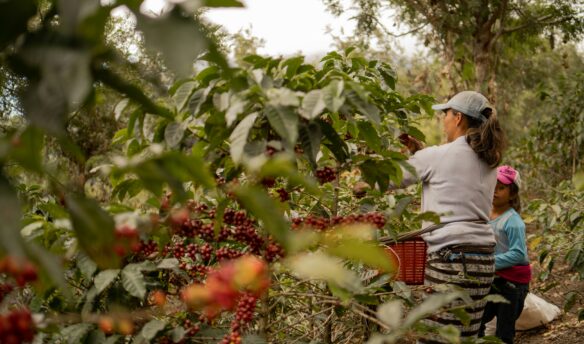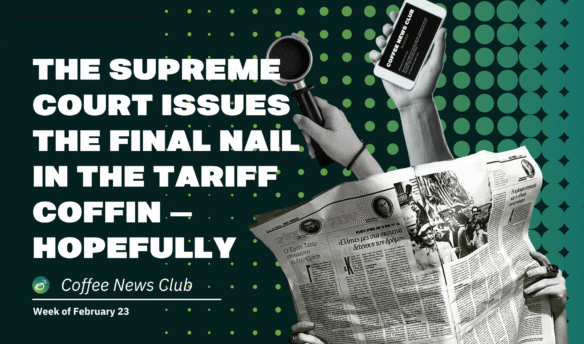Is Starbucks finally warming to its union? Plus, China is now the coffee chain capital of the world, and Finnish scientists go all in on beanless coffee.
‘China Overtakes US as Branded Coffee Shop Capital of the World’ – via the Guardian
The United States has always been the home of chain cafes. Branded coffee shops like Starbucks, Dunkin’, and Tim Hortons have dominated the market for decades, but the growth of branded shops in the US has slowed in recent years, presumably because of market saturation.
Not so in China. The number of chain coffee shops has skyrocketed to the point where the country has flown past the US to become the “branded coffee shop capital of the world.”
In the United States, 40,000 branded cafes opened over the last twelve months, representing a 4% increase. Meanwhile, in China, the number of chain shops increased by 58% over the same period, growing to almost 50,000 stores, according to research by the World Coffee Portal. Growth was driven by local chains Luckin Coffee, which recently overtook Starbucks as the largest coffee brand in China, and new startup Cotti Coffee. Both companies focused on quickly opening lots of small-format takeaway shops and grew by 5,059 and 6,004 locations, respectively, over the last year. Starbucks, by comparison, only opened 758 stores.
Starbucks is still the largest coffee chain in East Asia, but according to World Coffee Portal’s research, that could soon change. “As the total East Asian branded coffee shop market matures, rapidly expanding operators are increasingly seeking international growth opportunities,” World Coffee Portal said. “Cotti Coffee has entered South Korea, Indonesia, Japan and Hong Kong since opening its first store in China in 2022, while Luckin Coffee, Kopi Kenangan and Compose Coffee all opened their first international stores within the last 12 months.”
‘Starbucks Tells Union It Wants to Resume Contract Talks in January’ – via CNBC
Starbucks says it wants to resume contract talks with its union beginning in January, more than two years after the first Starbucks store unionized in December 2021. Of the 360-plus locations that have voted to unionize since then, not one has ratified a contract with the company.
“We collectively agree, the current impasse should not be acceptable to either of us,” Starbucks’ chief partner officer Sara Kelly wrote in a letter to Workers United president Lynne Fox. “It has not helped Starbucks, Workers United or, most importantly, our partners. In this spirit, we are asking for your support and agreement to restart bargaining.”
“We will set as an ambition and hopeful goal the completion of bargaining and the ratification of contracts in 2024,” Kelly wrote.
Since the beginning of the Starbucks unionization effort, the company has put parameters around the negotiation process, demanding that negotiations take place in person and done store-by-store, tactics Starbucks Workers United claims are stalling the process. Starbucks Workers United has pushed for hybrid negotiation meetings, which they say are more accessible, and Fox has previously gone on record requesting one nationwide contract to represent all unionized Starbucks stores. Although Starbucks has asked to restart negotiations, the company still insists on negotiating in person.
Starbucks has always claimed innocence when accused of stalling or anti-union tactics. However, according to a recent news release from the National Labor Relations Board, ”four NLRB Members, 19 administrative law judges, two federal district judges, and three federal appellate judges have issued a total of 44 decisions” that found the company guilty of violating various labor laws.
In a statement to CNBC, Fox noted that “we’ve never said no to meeting with Starbucks. Anything that moves bargaining forward in a positive way is most welcome.”
‘Scientists Publish Process To Create Lab-Grown Coffee’ – via Sprudge
Plenty of beanless coffee startups out there claim to offer all the taste of coffee with none of the environmental consequences. Well-funded brands like Minus, Zero, and Atomo have received hype and promote themselves as heralding a sustainable future for coffee—although what happens to the millions of farmers whose livelihoods depend on growing coffee is less clear.
Whatever the market might be for these trendy beanless brews, there’s clearly a lot of momentum (and money) behind them. So how are they made? Atomo, a beanless coffee brand that packages and sells coffee-like grounds, uses “breakthrough tech” to “extract coffee compounds from widely available and upcycled food sources,” according to their website. Zero Coffee makes a sparkling coffee beverage that the publication International Communicafe describes as “cell-based.” Minus, a brand marketing a ready-to-drink beanless coffee, says they replace coffee beans with other things like “upcycled pits, roots, and seeds.”
Because these are all for-profit businesses, these brands aren’t required to publicize the science behind their products. But one group of scientists hopes to make things more open and collaborative: two years after successfully producing lab-grown coffee, Finland’s VTT Technical Research Center has published detailed information about how they made coffee without coffee.
According to a news release, “the scientific paper describes the exact process the scientists used to produce coffee starting from the original coffee plant itself, and establishing cell cultures to alter its aroma in the roasting process, caffeine content, flavor analysis, and sensory profiling by a panel of tasters.”
The goal of the paper, published in the Journal of Agriculture and Food Chemistry, is to help the commercial viability of lab-grown coffee and encourage other companies and researchers to get involved. “It’s one thing to grow coffee cells in a bioreactor,” said Dr. Heiko Rischer, Principal Scientist and Head of Plant Biotechnology at VTT. “Making it a commercially viable product is a whole other matter.”
More News
‘World of Coffee expands to Central America in 2026‘ – via Global Coffee Report
‘Legal Dispute Between Montana Coffee Traders and Ghost Town Goes Public‘ – via Daily Coffee News
‘Ofi Sustainability Management System Receives GCP Recognition’ – via Global Coffee Report
‘Coffee Growers Organize to “Survive” the Bankruptcy of CISA‘ – via Havana Times
‘Instant Coffee Prices Risk Rising With Brazil’s Dryness Hurting Crops‘ – via Bloomberg
‘I-CIP Bounces Back in November 2023: ICO Report‘ – via Global Coffee Report
‘Coffee Design: A New Look For Olympia Coffee Roasting Co.’ – via Sprudge
The Week in Coffee Unionizing
- The National Labor Relations Board wants to force Starbucks to reopen 23 stores it says were closed to suppress organizing. A regional NLRB director issued the complaint, noting that eight of the stores had already unionized when they were closed. “This complaint is the latest confirmation of Starbucks’ determination to illegally oppose workers’ organizing,” Starbucks employee Mari Cosgrove said in a statement. A Starbucks spokesperson said the closings were part of the “standard course of business.”
- Starbucks released the results of a third-party audit requested by shareholders, which found that the company had no “anti-union playbook” or “instructions or training about how to violate US laws or suggesting surreptitious means of interfering with employees’ freedom to choose unionization or not.” However, the report found that the company was unprepared for the union campaign and didn’t have processes in place to respond.
- Workers at ReAnimator Coffee in Philadelphia have tentatively agreed to a union contract with the company after threatening to strike. It is the second Philadelphia barista union to win a contract after authorizing a strike in as many weeks, after Elixr Coffee workers used a similar tactic in their negotiations. “Due to [the strike] pressure and a willingness from the employer to make significant concessions and collaborate across the table both parties are happy to announce they’ve reached an agreement,” Philadelphia Joint Board Workers United wrote on Instagram. The contract includes at least a $3 per hour raise for all current employees, increased paid time off, and elimination of at-will employment. Union members at ReAnimator will vote to ratify the contract next week.
Beyond the Headlines
‘The Tubadipdrip: Chemex’s Own “AeroPress”‘ by Ethan McGonigal
‘Latte Art and Alternative Milks: The Good, The Bad, and the Tasty’ by Zoe Stanley






